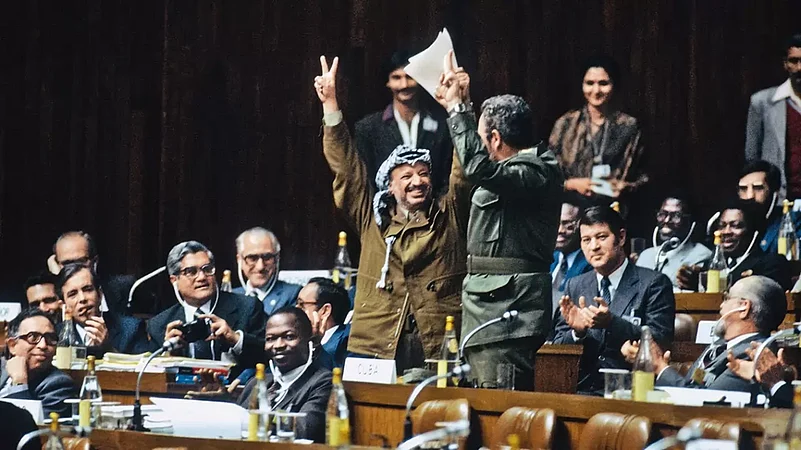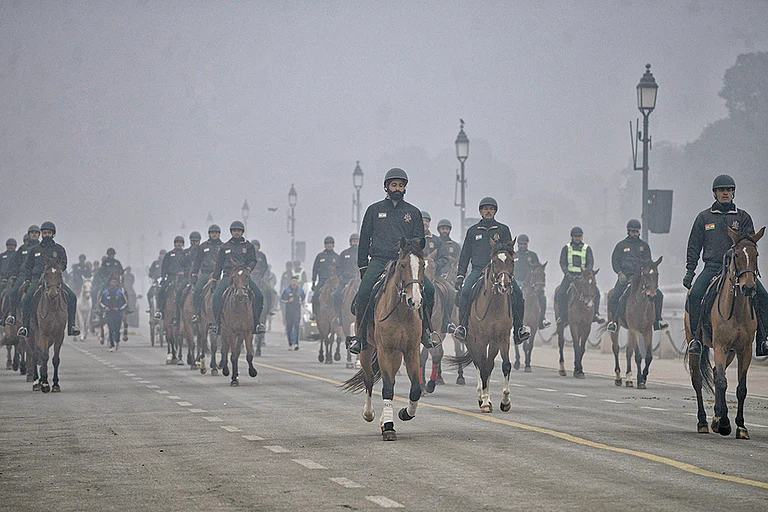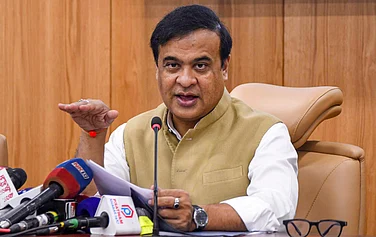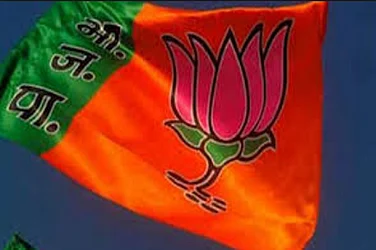India’s rock-like support for the Palestinian cause since the early years of Independence has undergone a radical transformation during the last few decades. Though India recognised Israel as early as in November 1950, the nation’s heart was with the Palestinians’ fight to live with dignity in their own land. Delhi did not have full diplomatic relations with Israel till 1992, but once this was established, there was no looking back. The decision was taken by former Congress prime minister, Narasimha Rao, a pragmatic leader who had opened up the Indian economy in 1991, and believed that India had to change with the times. In 1988, India was again one of the first countries to recognise the Palestinian state.
But even in the early years when there was massive public support for Palestine, there was empathy for Israel. Like the rest of the world, Indians too remembered the plight of the Jews and the extermination of six million Jews by Hitler. The Diary of a Young Girl by Anne Frank, the poignant story of a Jewish teenager, was familiar to most urban Indians. “Why must we fight for the right to live, over and over, each time the sun rises?’’ American author, Leon Uris, said in Exodus, a historical novel tracing the birth of Israel. Today, many would say that those lines could apply to the Palestinians who have endured over 70 years of hardship and to the civilians of Gaza deprived of food, water, electricity and medicine while being bombed out of their homes by Israeli jets.
Since India’s own independence struggle against the British colonisers, New Delhi had consistently supported the rights of the Palestinians. India’s foreign policy in the early years was always pro-Palestine and anti-apartheid. These were the two causes that were dear not just to the political leadership, but to the Indian public. Freedom movements and the liberal order were sweeping through the countries of Asia and Africa. In 1974, India was the first non-Arab country to recognise the Palestine Liberation Organization (PLO) as the sole and legitimate representative of the Palestinian people. The next year, in 1975, the PLO was allowed to open an office in New Delhi.
“The problem of Palestine is thus naturally a nationalist one—a people struggling for independence against imperialistic control and exploitation. It is not a racial or a religious one,” Jawaharlal Nehru, India’s first prime minister, said in one of his early public statements on Palestine. Not that he did not sympathise with the suffering of the Jews.
“Few people, I imagine, can withhold their deep sympathy from the Jews for the long centuries of the most terrible oppression to which they have been subjected all over Europe. Fewer still can repress their indignation at the barbarities and racial suppression of the Jews which the Nazis have indulged in during the last few years, and which continue today,” Nehru said.
India was aware that two wrongs do not make a right. The collective guilt of the West, at watching six million Jews being massacred by Hitler, led to the United Nations’ decision to partition the land of Palestine, then under the British, into separate Jewish and Arab states. The Arabs rejected the move and a war ensued. By the end of it, Israel expanded its territory and nearly 760,000 Palestinians fled the area. On May 14, 1948, Israel declared independence. America was the first nation to recognise Israel. That has been the story of Israel and Palestine ever since. Every war with the Arab states resulted in more territory for Israel, which armed itself to the teeth with the help of the US and its allies. India had consistently respected the two-state solution that can be the only basis for a just resolution of the Israel-Palestinian problem.
There was a time when Yasser Arafat, the charismatic leader of the PLO was a frequent visitor to India, and admired across the country for his feisty determination to fight for the rights of his people. Young Indians loved his revolutionary zeal.
Oslo Accord
The one major effort to break the Palestine-Israel logjam was the Oslo Accord brokered by Norway in 1993. That brought genuine hopes of a settlement and hopes that the two-nation theory would now be finally implemented. The famous handshake between arch foes, Israel’s former prime minister, Yitzhak Rabin, and the PLO’s chief, Arafat, with US President, Bill Clinton, looking on, was doomed to failure from the start. Extremists on both sides of the divide were opposed to what each saw as a sell-out of their interests. Rabin was assassinated in 1995 by an Israeli religious zealot who saw this as a betrayal. Rabin’s death was a major blow to the peace move. Hamas, the militant group that had opposed the deal from the beginning, carried out a number of terror attacks that undermined the Labour Party of the assassinated PM. In the 1996 elections, Benyamin Netanyahu’s Likud Party came to power. Since then, there has been no serious attempt to solve one of the world’s longest-standing conflicts. The world forgot about the Israel-Palestine conflict, and allowed Israel to do pretty much what it pleased.
Like the rest of the world, many of the Arab states of the region simply shut their eyes to the Palestinian issue. Delhi too gave the Palestine Authority a wide berth as ties with Israel grew rapidly. India continued to provide some amount of development aid. With the BJP in power, the relations really took off. In 2017, Narendra Modi became the first Indian Prime Minister to set foot in Israel and he was given a hero’s welcome by Netanyahu. That was a turning point, as unlike in the past, all visiting dignitaries made a point to stop in Ramallah for a meeting with the Palestinian leadership. Besides excellent defence and strategic ties, people-to-people relations also flowered. The overwhelming support for Israel comes from the BJP extended domestic support base. Yet it is also worth recalling that the BJP’s Atal Bihari Vajpayee, as foreign minister of India in 1977, clearly spelled out India’s stand on the rights of Palestinians. “For permanent peace in the Middle East, Israel must vacate Palestinian land it has illegally occupied,” Vajpayee had said then.
India is cleverly balancing its unabashed support for Israel with its long-standing belief in the two-state theory and the need to respect the rights of the people of Palestine. Hours after the Hamas attack, Modi, who shares a special friendship with his counterpart Netanyahu, expressed his support for Israel. “Deeply shocked by the news of terrorist attacks in Israel. Our thoughts and prayers are with the innocent victims and their families. We stand in solidarity with Israel at this difficult hour,” Modi said on X, formerly Twitter. Indians have filled social media platforms with support for Israel, so much so that Israeli ambassador in New Delhi, Naor Gilon, expressing his happiness over the people’s support for Israel, remarked to the news agency ANI that Israel “could have another IDF (Israel Defense Forces) with Indian volunteers”.
Yet five days later, during his weekly news briefing, MEA spokesman, Arindam Bagchi, while dubbing the Hamas attack as a “terror” strike, clarified New Delhi’s stand. “Our policy in this regard has been long-standing and consistent... India has always advocated the resumption of direct negotiations towards establishing a sovereign, independent and viable State of Palestine living within secure and recognised borders, side by side at peace with Israel. That position remains the same,” Bagchi said, reiterating New Delhi’s traditional two-state solution.
(This appeared in the print as 'Strategic Shift')



























